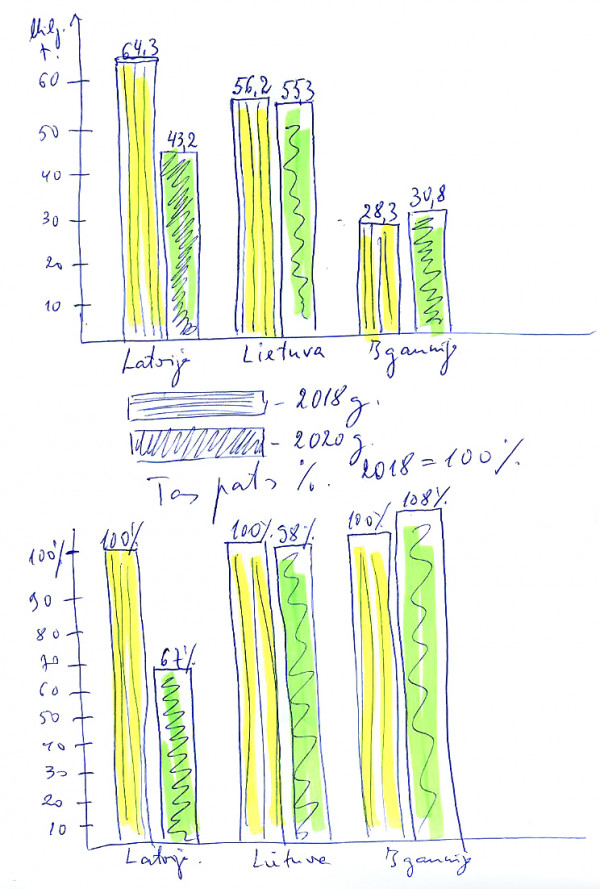Aivars Lembergs: The ruling coalition is pushing for the privatization of ports and railways
In the efforts of the government led by Krišjānis Kariņš (New Unity, Jaunā Vienotība) and Jānis Bordāns (New Conservative Party, Jaunā konservatīvā partija) to destroy the transit business, the goal of cheaply privatizing Latvian ports and railways can be seen, answering written questions from Neatkarīgā the mayor of Ventspils Aivars Lembergs concluded, who was imprisoned two months ago without justification.
At the extraordinary sitting of the Saeima on March 11 this year, Prime Minister Krišjānis Kariņš, in response to the reply of deputy Nikolajs Kabanovs, pointed out that the main problem to the Latvian economy so far has been the transit business.
K.Kariņš said: “Mr. Kabanovs, you are talking about what has, in my opinion, held our country behind in development for some 10-15 years: this outdated idea that transit will save us - a bridge between East and West. So where did it take us? We transport, transported oil products, coal, minerals, bulk cargo to our ports. When crossing our territory, /these cargoes/ go to the port and are sent out. Individuals may get rich from it, but unfortunately the country does not get rich from it. The money transit business, which you praise - the financial sector, as it worked for some time: there, individuals became very wealthy, but if you noticed, when the largest bank began the process of self-liquidation, the impact on GDP was completely imperceptible. It only shows how far this business was actually completely separated from our economy.
And this transit thinking - buy, sell, transport, we will get rich - because of this we are not rich. I will say the opposite of what you have said - this is the thinking that has impeded us for a long time. The vaccine for this is the smart reindustrialisation, which means jobs and wages for people, not wages for a couple of people who are able to earn in such a monopoly position simply at the expense of transit.”
Due to this statement, Neatkarīgā sent several questions to A. Lembergs and received answers soon enough.
What is your opinion on the new economic doctrine of the Prime Minister - transit (export of services) is harmful to the Latvian economy?
Arguing with a fool is like blaming the Moon for not being as warm as the Sun. Kariņš is against transit. So he is against road, rail, aviation and port connections with other countries. He is against the European Union's core transport network, in which Riga is the main city in Latvia; against Riga International Airport, against the international highway E-22, which starts in Edinburgh and ends in Moscow, against Rail Baltic. Kariņš is against the manufacturing industry because it also uses the international division of labor extremely widely. He is against banks and insurance companies. Kariņš opposes professional culture. There is hardly a production in our opera that does not feature "transit" artists.
Is Kariņš right by saying that transit has held Latvia back and benefits only a few individuals?
The truth is that Kariņš's government is deliberately, purposefully and effectively destroying Latvia's transport sector, including the Latvian state railway and state ports.
Are there specific figures that would describe the economic benefits (or, if K. Kariņš is correct, the losses) from transit?
The share of transport services in the total export of Latvian goods and services has decreased from 11.8% in 2018 to 7.9% in 2020.
This government aims to destroy the state railway and ports as much as possible, to make their infrastructure inferior to privatize it cheaply. This is clearly set out in the January 2019 work program of the actual head of Government, Bordāns. According to Bordāns and Kariņš, the biggest disadvantage of Latvia is being located by the Baltic Sea, where there are three major ports, at the crossroads of international roads. The "achievements" of the Bordāns-Kariņš government are impressive.
Is it known which world leaders have expressed similar views to Kariņš that the transit business is harmful to the country?
Any transit, including freight transit, “produces” gross domestic product, social, personal income, real estate and other taxes. Each tonne of transit is Latvia's income. Depending on the type of transit cargo, 11-15 euros are earned per tonne handled. If Latvia, as Bordāns and Kariņš want, refuses international division of labor or transit, then it is idiocy squared. It is not possible. Refusing transit - rail, ports, airports, road transport, passenger transport - is a foolish, absurd assumption. It is impossible! Neither Stalin nor Hitler has proposed total self-isolation. I do not know about North Korea.
What are the benefits or losses of destroying the transit business in Latvia for Lithuania, Estonia and other neighboring countries?
Neighbors, and we see this from the results of port operations in 2020, only benefit from such a Latvian self-isolation policy!

What could be the real reason why Kariņš expresses such views? Maybe this is a way to lower the price of the transit business infrastructure - the ports and, possibly, the Latvian Railway - for their planned privatization?
All these completely dense discussions cover up the privatization of port infrastructure, minimizing the market value of ports and railway assets. This is corruption. The bridge /between East and West/, which Latvia is successfully demolishing, has already been built by the neighbors. Latvia's self-isolation is at the expense of national poverty.
*****
Be the first to read interesting news from Latvia and the world by joining our Telegram and Signal channels.